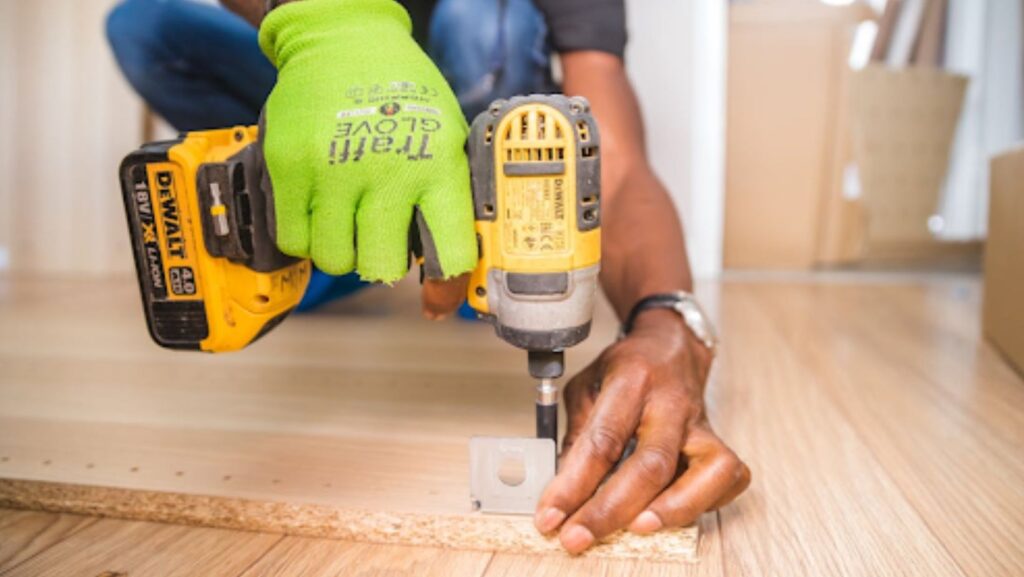Those who want to up their DIY skills and be safer when completing DIY projects could benefit from studying entry-level trade skills (and gaining certifications), such as HVAC maintenance, electrical, and plumbing skills.
Here are seven skills you may want to learn…
Basic Carpentry
Carpentry is one of the most useful entry-level trade skills for DIY enthusiasts. It covers the basics of measuring, cutting, and assembling wood to create or repair structures like shelves, fences, or small furniture pieces.
It’s not just about hammering nails into wood. You’ll learn how to read measurements properly, choose suitable materials for specific tasks, and use tools like saws and drills safely. Accuracy matters as much as effort in carpentry work!
By mastering these foundational techniques, you can handle projects confidently while avoiding common mistakes that waste time or materials.
Electrical Safety Fundamentals
Understanding basic electrical safety can prevent accidents when working on DIY projects involving wiring or outlets.
This skill focuses on learning things like how electricity works, the importance of shutting off power at the breaker box, and identifying live wires safely.
You’ll also learn to handle essential tasks like replacing light fixtures or installing new switches.
And using tools like voltage testers ensures your work area remains hazard-free.
Community colleges, trade schools, or online courses often offer short certifications in electrical basics, giving you practical skills to perform simple jobs responsibly while minimizing risks.
HVAC Maintenance Basics
HVAC systems keep homes comfortable year-round, but minor maintenance tasks can often be tackled with the right skills.
Learning basics like cleaning air filters, checking for airflow issues, and understanding thermostat functions can save money and prevent system failures.
For more technical skills—like identifying common HVAC problems or safely working with refrigerants—proper training is essential.

Trade schools provide technical training programs with hands-on instruction to help you learn the skills you require. For instance, AAI’s programs include HVAC, electrical skills and more.
These foundational abilities ensure you approach small fixes confidently without risking damage to complex equipment.
Plumbing Essentials
Plumbing issues like clogged drains or leaky faucets are common in every home. Knowing how to fix them saves money and prevents water damage.
Entry-level plumbing skills include understanding pipe fittings, sealing leaks with plumber’s tape, and unclogging sinks or toilets using tools like plungers or drain snakes.
These tasks may seem simple, but they require a grasp of water flow systems and proper tool usage.
Short-term courses at community colleges or technical schools can provide practical training for beginners.
Building these skills lets you handle basic repairs without calling a professional for minor problems.
Masonry and Concrete Work Skills
Working with concrete or masonry adds a durable touch to DIY projects, whether you’re repairing a cracked walkway or building a garden wall.
Basic skills include mixing concrete properly, laying bricks evenly, and using tools like trowels and levels.
Precision is key in masonry to ensure stability and longevity.
Learning techniques for preparing surfaces, reinforcing structures, and handling materials safely sets the foundation for successful results.
Trade schools or workshops often provide beginner courses in these areas, giving hands-on experience that boosts your confidence when tackling small-scale home improvement tasks.
Painting and Surface Preparation Techniques
A fresh coat of paint can completely transform a space, but good results start with proper preparation.
Skills like cleaning surfaces, sanding imperfections, and applying primer ensure paint adheres smoothly. Learning to cut in edges with precision saves time and reduces touch-ups.
Choosing the right tools, such as rollers or brushes for specific finishes, also makes a big difference. These practical techniques help create professional-looking outcomes.
Local workshops or introductory courses at community centres teach these basics hands-on, equipping you to tackle home painting projects confidently without unnecessary mess or wasted effort.
Tool Operation and Safety Practices
Lastly, knowing how to safely operate basic tools is essential for any DIY project. Skills include handling hand tools like hammers and wrenches, as well as power tools such as drills, saws, or sanders.
And understanding safety measures—like wearing protective gear and securing materials properly—prevents injuries.
It’s not just about using the tool but also maintaining it, from sharpening blades to checking for electrical faults in power equipment.
Many community colleges or technical schools offer short workshops focused on safe tool use.
These skills ensure efficiency while prioritizing your safety during projects.


More Stories
Why Seasonal Lawn Care Services Is a Must for Keeping Your Grass Healthy Year-Round
Why Sacramento’s Food Scene is World-Class
Leading Residential Property Management Companies in Australia